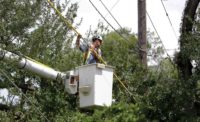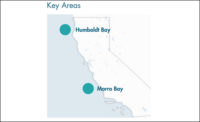German energy developer RWE will purchase New York City-based utility Consolidated Edison’s clean energy business for $6.8 billion, subject to approvals—setting up a pipeline for construction of 24 GW of onshore wind, solar and battery storage projects that it says will add to about $15.3 billion of renewables business investments it reports in the U.S.
“The acquisition of Con Edison Clean Energy Businesses is a major boost for RWE’s green expansion in the U.S., one of the most attractive and fastest growing markets for renewable energy,” Markus Krebber, RWE’s CEO, said in a statement.
Con Edison’s development pipeline is one of the largest in the U.S., he said.
Once completed, RWE will be the fourth-largest renewable energy company in the U.S, and the second largest solar project operator, the company said. RWE will have more than 7 GW of operating assets in the U.S. when its existing U.S. portfolio is combined with Con Edison’s current capacity.
The transaction will be backed by a $2.4 billion investment from the Qatar Investment Authority, which will give that country's sovereign wealth fund more than a 9% interest in the German utility company.
RWE also is moving ahead with offshore wind energy development projects in the U.S., including a joint venture with National Grid to develop projects in the New York Bight, an area of the Atlantic Ocean south of New York City. The company secured a federal offshore lease in February that has potential to build 3 GW of generation and also has a joint venture with New England Aqua Ventures to build floating offshore wind turbines in deeper water off the coast of Maine.
RWE also is collaborating with the Greater New Orleans Offshore Wind Alliance to develop a program to accelerate Louisiana’s offshore wind supply chain. The group seeks existing Louisiana oil and gas development companies with transferable capabilities for offshore wind.
“The goal is to provide leading energy companies, like RWE, with actionable supply chain contacts to fulfill goals of deploying several gigawatts of offshore wind power,” RWE said, adding that the just enacted Inflation Reduction Act "sets a stable and reliable 10-year framework for investments in clean energy.”
The transaction must be approved under antitrust laws and by the Federal Energy Regulatory Commission and the Committee on Foreign Investment in the U.S. The deal is expected to close in the first half of 2023.
Timothy Cawley, Con Edison’s chairman and CEO, said in a statement that the sale of the clean energy units will allow the company to focus on its utility businesses and investments as well as utility-owned renewable generation.
Other Utilities Consider Their Options
Other U.S. utilities also are considering selling their competitive renewable assets, Paul Patterson, an energy sector market analyst with Glenrock Associates, told ENR.
“Some utilities see the risk of their rate of return on renewable projects added to rate base as more favorable,” he said. Projects not included in rate base rely on power purchase agreements.
Investor-owned utility American Electric Power plans to invest in its regulated businesses, the Cleveland-based company said Oct. 4.
While the firm, which operates in 11 states, plans to invest $9 billion in regulated renewable energy for its utility ratepayers, it also plans to sell its unregulated renewables assets in a transaction set to close in the second quarter of 2023.
Bids are due this month for the unregulated wind and solar projects.
The company plans a $40-billion capital investment through 2027 that also includes distributed energy and transmission.
Duke Energy said in August that it would look for potential buyers for its unregulated renewable energy portfolio in favor of investing in renewable projects that earn a regulated rate of return. Its portfolio of 5 GW of wind and solar projects is estimated to be worth about $4 billion.
Earnings from its commercial renewable energy business was flat, which prompted Duke to begin a strategic review of its portfolio, the company said during its second-quarter earnings call on Aug. 4. Its regulated utilities are expected to grow much more rapidly than the unregulated renewable business, the company said.
In an Oct. 4 update of its 10-year capital investment strategy for its seven regulated utilities, Duke said it would spend $145 billion for critical energy infrastructure, a $10-billion hike over the last decade. This includes about $75 billion to modernize and harden its transmission and distribution infrastructure; $40 billion for zero-carbon generation, such as solar, wind and battery storage, and extending the life of its nuclear power facilities; and about $5 billion in hydrogen-enabled natural gas technologies.
Meanwhile, an activist RWE investor that owns about 1 million shares of the firm criticized its pending Con Ed transaction for happening in the midst of Germany's currrent energy crisis. "We have made very clear that this transaction won’t lead to any scale down in investment in Europe,” RWE CEO Krebber said on a call with reporters. “We are accelerating everything that is needed.”





Post a comment to this article
Report Abusive Comment